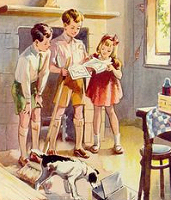
The Naughtiest Girl Again
Review by Keith Robinson (December 7, 2006)
This is a refreshing read, even if it is a little "goody-two-shoes" for my liking. But who wouldn't enjoy the constant bullying, the fight scenes, the endless arguing, the naughty tricks... and of course the cool, calculated Meetings where things are sorted out with great wisdom by the Jury!
Whyteleafe School is a school unlike any other, for the children are allowed to set their own rules (within reason) and govern themselves in a great deal of important matters, while the adult teachers literally take a back seat. The weekly School Meetings are attended by every child, and at the front of the gym stands a table around which the twelve elected monitors sit. The Head Boy and Head Girl (in this book Wlliam and Rita) act as spokespersons for the Jury, handing out whatever decisions are reached to a breathless audience.
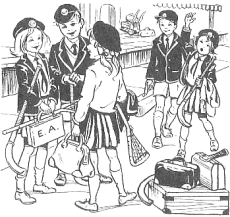
William goes on to explain that, with twenty pence each, everyone is equal. If more money is needed for any reason, then the request can be put before the Jury to decide. One example of this is Mary, whose mother is abroad. Mary has to write once a week, and it's hardly fair that she should have to spend her pocket money on postage – so the Jury grants her the postage each week. (In my opinion, Mary's mother should have made an allowance for this! – or perhaps she did but this allowance was handed in to the kitty at the beginning of term along with the rest of Mary's money!)
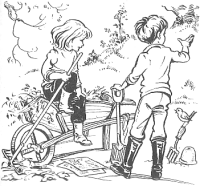
Another very good example of the handling of finances comes when Leonard, one of the bigger boys, confesses to breaking a window while playing with a cricket ball. He asks for money to repair it, since he can't possibly afford it out of twenty pence a week... but the Jury deny him the money, and decide to punish all the boys and girls that were fooling about with the cricket ball in the common room by making them all share the cost for a replacement window. The small group stand up and meekly accept the punishment. Now would that happen in real life? I mean, really? But it's a nice idea.
When it comes to bullying, fighting, and all the rest of things that naughty kids do, these matters are not taken lightly by the Jury. No one likes a tattle-tale, so it's only the gravest situations that are brought up. And this is where Elizabeth Allen comes in...
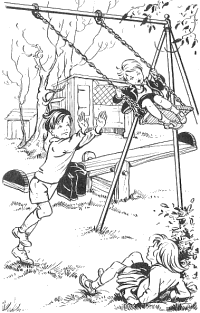
It's not too long before Elizabeth catches him red-handed, bullying a younger boy named Peter by swinging him far too high on the swings and making him sick. Elizabeth is furious, and slaps Robert – and he would have hit her back if other children hadn't wandered by at that very moment. As it is, the matter is brought up by an angry Elizabeth at the next School Meeting, and Robert duly accused.
Unfortunately this backfires on Elizabeth, because there were no witnesses to the actual bullying, only the tail-end when Elizabeth slapped Robert. Worse, Peter denies he was being bullied – because, as it transpires later, he's been "got at" by Robert and told to shut up about it. So, in the absence of any evidence or witnesses, Elizabeth finds herself having to apologize to Robert. How frustrating!
This leads to endless friction between the two, and rather than fight it out in public, they take to outdoing each other at every turn – a funny situation when it comes to striving for better school marks just to spite each other! If only ALL kids hated each other so much they worked extra hard... But it's not just good grades these two compete for, but also a place on the lacrosse team, one of many sub-plot elements that brings a lot of disappointment and bitterness along the way.
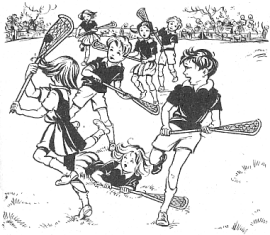
Kathleen, not well liked in the first place, becomes even more surly and unfriendly after these insults, and starts getting back at Jennifer by playing secretive, mean tricks on her... and on Elizabeth too, just for poking her nose in. Thus, Jennifer's French homework suddenly develops unsightly ink blots and her white mice end up in Miss Ranger's desk drawer; meanwhile, Elizabeth's books go missing and her carefully-cleaned garden tools grow mysteriously dirty overnight (something John, the head of the school garden, finds very irritating).
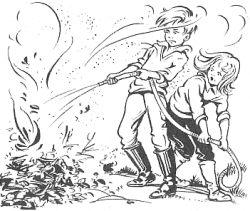
There are other sub-plots throughout the book too, but most center around Elizabeth trying to curb her fiery temper. All in all it's a book about naughty children turning into good 'uns, and hot-tempered children promising to be more patient in future, and small "cowardly" boys learning to stick up for themselves.
As mentioned earlier, the concept of children being their own "Judge and Jury" is a neat one – but I can't see it happening in real children of this age group, at least not throughout the whole school... and certainly not in this day and age. Perhaps that's the difference though – children of Blyton's era had a stricter upbringing, and after all this is a well-to-do boarding school, not some cheap public day-school. ;-)
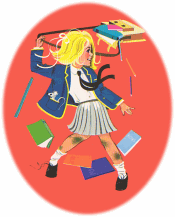
It might have been interesting to see what would happen if a kid, or group of kids, decided NOT to comply with the rules; surely the elected monitors cannot take money from those who don't wish it? Yes, these pre-teen anarchists would be ostracized by the majority, but what an interesting tale it would make!
As I write this review, I've only read this one book in the series, the second of three. It's interesting to note that this series has been continued by another author, so there are currently eight books altogether.


